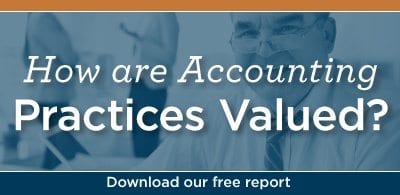

Legal contracts can be very lengthy and at times repetitive. The nature of these legal financial contracts can be extremely problematic when it causes all parties involved to lose sight of important details. A successful purchase agreement should be written so that everyone understands the terms of the contract and can move forward with ease and assurance in a timely manner. If you are buying or selling a CPA Firm , your purchase agreement should cover these five essential deal terms accurately, completely and simply.
CPA practice valuations are subjective and vary greatly. Ultimately, price depends on what a buyer is willing to pay, how a buyer is willing to pay, and what a seller will accept. Stating the price in a contract is relatively straightforward unless there are retention contingencies .
From our experience, the lion’s share of practices sell in the range of .9 to 1.3 times gross fees. Bear in mind that most of Poe Group Advisors’ accounting practices sell for fixed prices at closing. Deals with contingent terms may lose a lot of the practice value due to poor transitions, and poor service after closing.
In general, there are more buyers in large metropolitan areas than in rural ones. The number of potential buyers for a practice is a key concept that must be top-of-mind when considering market value.
There is a “sweet spot” for firms. There tends to be more buyers for accounting firms that can be bought and operated by a single owner. Practices under $ 1,500,000 generally fit into this category.
Professionally marketed practices tend to sell for higher multiples with cleaner terms. Having an experienced intermediary maximizes the number of qualified buyers interested; and allows owners to stay focused on the practice while it is being marketed. Also, growth trends are important to maintain and the time and energy needs of selling a firm should be minimized. A good intermediary also adds value for the buyer by sharing best transition practices.
As you’d imagine, the more profitable the firm, the higher the value. Fee quality and owner hours are also major considerations when evaluating profitability.
Seller/Vendor financing and contingent pricing will impact the price. Cleaner terms are much more desirable for the seller and therefore generally go with a lower price.
Having an office in a desirable location, with good systems in place, and a neat office all increase value.
In specific situations other factors may also come into play and impact the CPA Firm’s value. . Quality of staff, employee competitive threats, partner non-compete issues, non recurring revenues, very strong growth, declining revenue trends, and very large clients are some of the more common factors encountered.

At Poe Group Advisors, we prefer the simplicity of a cash deal whenever possible. Approximately half of our transactions are sold with 100% cash at closing, while approximately 90% of our transactions have fixed-price structures, leaving only about 10% with any contingencies. We believe a small discount for the seller is well worth having clean terms with shortened or removed contingencies. Fixed pricing also helps both parties in the deal, generally resulting in better transitions.
Clean terms are not only easier to document, terms impact the deal after closing in interesting ways. Retention based deals with “earnouts’ ‘ is one way a CPA Firm purchase agreement can be structured, very different from an agreement with clean terms. According to SRS/Acquiom , in general business sales, 2/3 of retention based deals give rise to conflicts with escrowed funds.
Earnouts are popular deal structures for CPA firms that are sold privately, but they have major drawbacks. In an earnout, a buyer pays the seller by using the future earnings that are actually experienced by the buyer. In a pure earnout arrangement, the buyer takes zero risk in the purchase and pays no interest, while the seller essentially assumes all of the risk. This misplaced risk often keeps the seller involved in the practice for a long time after a sale. Having too many “cooks in the kitchen” can be very problematic in the management of the firm after closing.
Some of the issues firms frequently run into with earnouts directly relate to misunderstood roles of the seller and buyer after closing. These misunderstandings often negatively impact the seller’s exit and the buyer’s ability to prosper.
If there is one section of the agreement to be extra clear about up front it’s the non-compete section. Hopefully the seller’s intentions are disclosed and transparent before getting to the offer stage. For buyers, this section tends to be quite sensitive if changes are proposed by the seller. It helps to also know what bank requirements are for the non-compete section. We have seen separate non -compete agreements, but for an accounting practice sale , the non compete agreement can be quite succinct as long as the below 4 primary points are well documented:
The main thing to accomplish with the non-compete agreement is to prevent the seller from serving the clients of the practice being sold. The non-compete agreement should reference a complete list of all of the clients being sold as well as all clients being kept by the seller (if any). The seller should not be able to serve or solicit clients of the firm regardless of distance.
Non-compete agreements should contain a provision for distance. If the seller operates in a different market area, that will not be confusing to clients and is typically a very low threat to the buyer. From a legal perspective, an excessive distance is not enforceable.
Buyers should ensure that their non-compete agreement is enforceable under local laws. Most jurisdictions will not enforce non-compete agreements that cover too much geography or too long a period of time.
What specifically is the seller allowed to do after closing? If the seller wants to keep a component of the practice or keep certain clients, make sure the non-compete agreement is specific and clear. If the seller wants to do other types of work that could be considered “public accounting” then that needs to also be specific and clear.
Also keep in mind that non-compete agreements have tax consequences. A portion of the purchase price should be allocated accordingly.
After price, payment terms and non-compete agreements, transition is the most important item in the offer. Too often buyers just throw out a number of hours for the transition time without considering all steps involved and required. . By thinking through the steps and asking the right questions, the buyer can make a calculated offer that both seller and buyer can be comfortable with.
The key to a successful transition is to have the right purchaser for the practice being sold; otherwise the transition time, transition plan, communication and team member care won’t matter. Ensure that professional experiences, management styles and client service philosophies match up fairly well.
Due diligence when buying a CPA firm tends to happen fairly quickly after a deal is struck. The contract should clearly define the due diligence period and the process for withdrawing from the agreement.
When approaching the due diligence process, focus on only the high-level information. Don’t get buried in too many details. We’ve seen buyers want to jump right into the details and end up losing sight of the big picture items that really help them determine their opportunities and obstacles. Most of the high-level information is gathered through inquiry.
Other common closing conditions that must be documented in the purchase agreement include bank financing and lease assignments. Seller financing is generally documented in summary in the price or terms section and is accompanied by a separate promissory note.
Most of these items can be easily documented with some care and thoughtful planning.
The key to successfully navigating a deal through the contract negotiation process is to avoid spending too much time on “everything else.” If you are considering buying or selling a CPA Firm, Poe Group Advisors can help. Contact Poe Group Advisors today to get the answers you need.
Be sure to check out our podcast “ How Good Legal Contracts Impact Your Business ” with Chris Sloan. This is an excellent resource with a refreshing approach to creating contracts